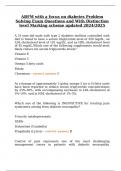ABFM with a focus on diabetes Problem
Solving Exam Questions and With Distinction
level Marking scheme updated 2024/2025
A 51-year-old male with type 2 diabetes mellitus controlled with
diet is found to have a serum triglyceride level of 350 mg/dL, an
LDL-cholesterol level of 101 mg/dL, and an HDL-cholesterol level
of 45 mg/dL.Which one of the following supplements would most
likely reduce his serum triglyceride levels?
Vitamin E
Vitamin C
Omega-3 fatty acids
Folate
Chromium - correct answer C
At a dosage of approximately 3 g/day, omega-3 (or n-3) fatty acids
have been reported to reduce serum triglyceride concentrations
by 25%-30%, with accompanying increases in LDL-cholesterol of
5%-10%, and in HDL-cholesterol of 1%-3%.
Which one of the following is INEFFECTIVE for treating pain
syndromes arising from diabetic neuropathy?
Tricyclic antidepressants
SSRIs
Duloxetine (Cymbalta)
Pregabalin (Lyrica) - correct answer B
Control of pain represents one of the most challenging
management issues in patients with diabetic neuropathy.
,Tricyclic antidepressants, anticonvulsants, and topical capsaicin
have been shown to reduce the pain of diabetic neuropathy.
Pregabalin and duloxetine are both FDA-approved for the
treatment of diabetic peripheral neuropathy. Limited evidence
suggests that SSRIs are no more effective than placebo. Although
interventions with NSAIDs, transcutaneous electrical nerve
stimulation (TENS), ACE inhibitors, and tramadol have been
reported for diabetic neuropathy, systematic evaluations have not
been published.
At a routine health maintenance visit, a 42-year-old obese male is
found to have a fasting plasma glucose level of 118 mg/dL. Which
one of the following is the most appropriate initial intervention
for preventing or delaying the development of diabetes mellitus
in this patient?
Lifestyle modification
Metformin (Glucophage)
A thiazolidinedione
An oral sulfonylurea agent
An ACE inhibitor - correct answer A
Based on the clinical practice guidelines of the American
Diabetes Association, impaired fasting glucose (IFG) is defined as
a fasting plasma glucose of 100-125 mg/dL, and impaired glucose
tolerance (IGT) as a 2-hour plasma glucose of 140-199 mg/dL.
These two categories have been officially termed prediabetes and
are considered risk factors for future diabetes and
cardiovascular disease. Lifestyle modification focusing on weight
loss and physical exercise is regarded as first-line therapy for
preventing or delaying diabetes mellitus in patients with
prediabetes. In the Diabetes Prevention Program (DPP), lifestyle
modification (5%-10% weight loss and moderate physical activity
of 30 min/day) was associated with a 58% reduction of risk for
developing diabetes. Metformin can be considered for very high-
risk individuals (elevation of both IFG and IGT and at least one
,other risk factor such as hemoglobin A1C >6%, hypertension,
low HDL-cholesterol, elevated serum triglycerides, or family
history of type 2 diabetes mellitus in a first degree relative); in
the DPP it was associated with a 31% reduction in risk. It was
most effective in patients with a BMI of at least 35 kg/m2 who
were under age 60.
A 77-year-old obese male sees you for a routine visit. He has a
20-year history of hypertension, a 12-year history of type 2
diabetes mellitus complicated by the development of
microalbuminuria and proliferative diabetic retinopathy, and a
history of an inferior myocardial infarction 2 years ago. Although
his diabetes had been adequately controlled with extended-
release metformin (Glucophage XR), 500 mg twice daily, you
recently added extended-release glipizide (Glucotrol XL), 2.5 mg
once daily in the morning, because his hemoglobin A1c rose to
7.1%. He reports that since then he has episodically experienced
shakiness and diaphoresis in the late morning, relieved by
drinking orange juice. Several of these episodes have occurred
during walks he takes with his wife before eating lunch.Which
one of the following would be the most appropriate
management?
Reducing his metformin dosage to 500 mg in the morning
Discontinuing glipizide and keeping the patient on his previous
drug regimen
Discontinuing glipizide and substituting nateglinide (Starlix)
Advising the patient to eat lunch earlier in the day
Advising the patient to delay his walk until after lunch - correct
answer B
Although studies have clearly shown that intensive glycemic
control reduces the risk for microvascular complications in
patients with diabetes, it remains unclear whether it reduces the
, risk for cardiovascular disease as well. ACCORD, ADVANCE, and
the Veterans Affairs Diabetes Trial have failed to show benefit,
and the ACCORD trial actually reported an increased mortality
rate in patients with type 2 diabetes treated with intensive
therapy with a target hemoglobin A1c of <6.0%. Subjects in the
ACCORD trial averaged 62 years of age and had diabetes for a
mean duration of 10 years. Subjects either had a history of a
cardiovascular disease (CVD) event between the ages 40 and 79,
or had significant CVD risk and were between the ages 55 and
79. Based on the data available, the American Diabetes
Association, in association with the American College of
Cardiology Foundation and the American Heart Association,
issued a position statement advising that less stringent
hemoglobin A1c goals may be appropriate for patients with a
history of severe hypoglycemia, limited life expectancy, advanced
microvascular or macrovascular complications, poor health, or
long-standing diabetes mellitus recalcitrant to therapy. A
hemoglobin A1c of <7.0% is still recommended for the majority
of patients with diabetes mellitus, with a target hemoglobin A1c
closer to normal reserved for healthy patients with a short
duration of disease and a long life expectancy (SOR C).
True statments regarding dipeptidyl peptidase-4 inhibitors
include which of the following? (Mark all that are true.)
They are more effective than metformin for lowering hemoglobin
A1c
They reduce insulin resistance
They augment glucagon secretion
They are weight neutral
They are not associated with hypoglycemia - correct answer D
AND E




